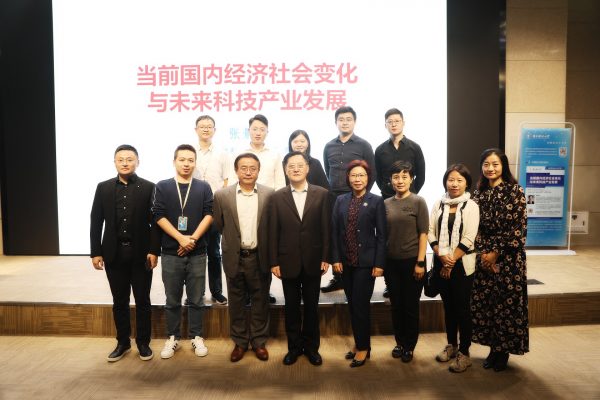The School of Innovation and Entrepreneurship at Southern University of Science and Technology (SUSTech) continued its iLEAP series of lectures, welcoming International Eurasian Academy of Sciences (IEAS) Academician and former Secretary-General of the Ministry of Science and Technology (MOST) Zhang Jing’an to SUSTech. His lecture was titled “Current domestic economic & social changes, and future technological industry development,” was hosted by School of Innovation and Entrepreneurship Dean Liu Ke.
Zhang Jing’an is an IEAS Vice President, the former League Secretary of Renmin University of China, the former Secretary General of Ministry of Science and Technology of China, and the former proprietor of Science and Technology Daily. He has been involved in a significant amount of scientific and technological policy-making since the 1980s, publishing many books and papers. Zhang Jing’an has held many high-profile positions in government.
In his lecture, Zhang Jing’an first examined the innovation-driven development strategies for the new era. He pointed out that it was essential to cast a wide net of innovation across science & technology, systems, management and business models. The implementation of an innovation-driven development strategy is inevitable to deal with environmental challenges and the impact of the autonomous industrialization of the economy. The grasping of this transformation will help lead China’s economic development for the future.
China’s scientific and technological development has significantly improved and Zhang Jing’an highlighted specific cutting-edge areas such as quantum science, nanotechnology, global climate change and stem cell technology. A wide range of scientific research projects had also seen China make scientific progress ahead of the rest of the world. There is room for China to develop in fields like satellite navigation, supercomputing, quantum communication and deep sea exploration.
Zhang Jing’an spoke on the importance of the Belt & Road Initiative in expanding industry-university research cooperation to a global level. The changes facing the world meant that there are numerous developmental opportunities for countries to work together for the betterment of society, and China was taking the lead in encouraging different forms of international collaboration.
At the conclusion of his lecture, he focused on eight prominent aspects of domestic economic and social development in high-tech industries. Zhang Jing’an pointed out that the only way for the Chinese economy to get stronger is to develop through high-quality transformation. The transformation of its manufacturing must be developed into the new stage of innovative entrepreneurship that will lead China into the new era. Industries like new materials, artificial intelligence, 5G and the digital economy were just a few examples he gave as accelerators of high-quality economic development for China.

In the Q&A session that followed his lecture, both Zhang Jing’an and Liu Ke took many questions from the faculty members and students in attendance, covering a vast array of issues.
The iLEAP lectures from the School of Innovation and Entrepreneurship take place every two weeks, inviting top entrepreneurs, economists and industry experts from around the world to share their experience with the SUSTech community.

Proofread ByXia Yingying
Photo BySchool of Innovation and Entrepreneurship